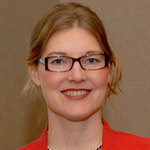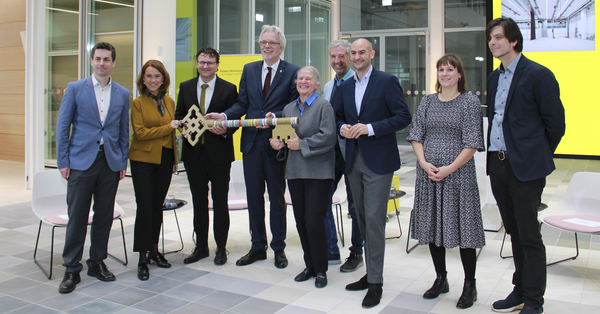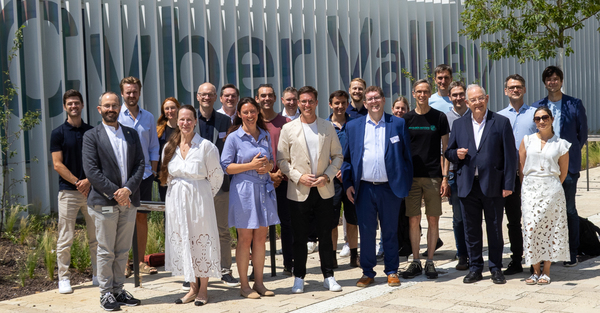Max Planck Institute celebrates double anniversary
Prominent guests look back on 10 and 100 years of scientific excellence at Neues Schloss

The importance of both institutes for Baden-Württemberg – as well as Germany as a whole – as a center for research was also highlighted. In particular, the impact generated by recent research results in machine learning, computer vision and robotics has made the Stuttgart and Tübingen region and beyond one of the world’s leading centers for research into artificial intelligent systems.
“When I started working on machine learning, it grew out of a scientific interest in understanding how to detect patterns in observations,” says the institute’s Managing Director, one of the world’s most cited AI researchers, Prof. Bernhard Schölkopf. “I had no idea how much our world would change, and how my home area would change, too. Technical systems of the future will deal with the complexity of the world by learning from observations. This is a paradigm shift that is universal, from astronomy and climate research to medicine. The path from basic research to application is short here, and the people involved are often one and the same. Our Max Planck Institute has been at the center of this development for ten years.”
Prominent guests, who have contributed significantly to the institute’s success and strongly supported it from the beginning, were invited to Stuttgart’s Neues Schloss. In attendance was Baden-Württemberg’s Minister President Kretschmann, who recognized the importance of the research field of machine learning early on and has strongly supported it over the years. Kretschmann was therefore full of praise: “Some observers wonder: How did they manage to do it? From my point of view, there are three factors: The right attitude. The right people. The right vision.”
Referring to Europe’s largest research consortium, Cyber Valley, he said: “When we launched Cyber Valley in 2016, it was clear to us: if we do this now, we have to do it with our full commitment. That’s why the motto is: We are not doing things by halves!” The Minister President also praised the vision behind the network of Europe’s leading AI centers, the European Laboratory for Learning and Intelligent Systems – ELLIS for short. “With Ellis, our region will finally become the hub for a dedicated AI competence in Europe.” He also emphasized that research must always serve to allow people to live in freedom and dignity. These values, he said, are precisely what drive researchers at the MPI for Intelligent Systems. “Therefore, I am looking forward to the future of the institute here in our land.”
The Max Planck Society’s (MPG) President Stratmann also expressed his pride in the MPI for Intelligent Systems and the MPI for Metals Research. Although a metals researcher himself who had always admired the world-renowned materials research at the MPI-MF, Stratmann was the driving force in the Max Planck Society to attempt a radical transformation and reorientation. At the time the MPG’s vice president, he had strongly supported the shift toward intelligent systems in 2009.
“The MPI for Metals Research was always modern in the best sense of the word and open to the future. So it was perhaps no wonder that, over ten years ago, people here were willing to embark on a completely new adventure,” says Stratmann. “At the time, we were discussing an interesting future field of research in the Chemical Physical Technical Section, the field of cognitive robotics. In the course of the deliberations, our view broadened beyond cognitive robotics into the field of machine learning and artificial intelligence in general – by the way, long before this field of research gained the importance it has today.”
There seems to be an unspoken agreement in Baden-Württemberg, Stratmann continued, that if an idea makes sense, politics, business and research pull together. “I notice this here again and again, and it’s impressive. People think and act with a long-term view; but that’s precisely what can lead to success in the short term – if you make the right decisions at the right moment. As has happened here. By doing so, you have all performed a service not only to the state of Baden-Württemberg, but also, in my eyes, to Germany as a center of science.”
President Stratmann therefore also appealed to all employees of the Max Planck Society to pursue the science that excites and fascinates them. “Take the paths that maybe no one else has taken before you, tread into uncharted territory. In science, as perhaps nowhere else, the saying holds true: only those who dare win.”
The event also included two scientific presentations – one in the field of materials research and one in the field of machine learning. Prof. Dr. Claudia Felser, Director at the Max Planck Institute for Chemical Physics of Solids, gave a talk titled “From topology to green hydrogen.” Dr. Joaquin Quinonero-Candela, until recently Distinguished Technical Leader for Responsible AI at Facebook, spoke on the topic of “Responsible AI”. He spoke about the importance of not leaving the development and application of AI to the US and China alone. Europe, he said, must take a leadership role with its culture and values. The world needed Europe as a leading force in artificial intelligence and machine learning.
The researchers at MPI-IS are committed to this mission. People are the ones at the center of research at the MPI for Intelligent Systems, Bernhard Schölkopf concluded: “Anchored in the process by which our institute reinvented itself was the shared belief of all involved that if we want to positively shape the future, it is primarily about people.”
Video
Director of the Perceiving Systems Department at the Max Planck Institute for Intelligent Systems
Related Articles







